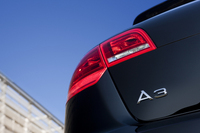Eureka! Audi Spotlights Bright Future for Diesel Technology in 1,000-Mile Green Car ff The Year Tour - VIDEO ENHANCED
 |
• On ‘Eureka! Diesel Drives the Future tour, two Audi A3
TDI cars will cover the length of California on Rentech synthetic diesel
• Demonstration next week will show how advanced diesel technologies and
fuels can answer significant energy challenges soon
• Event caps successful run for the Audi A3 TDI as the Green Car Journal's 2010 Green Car of
the Year
SEE ALSO: Audi Buyers Guide
HERNDON, VA - October 18, 2010: Audi TDI clean diesel technology – with its ability to reduce carbon emissions by 20% and its 30% fuel-economy gains over comparable gasoline engines – has demonstrated it belongs in the conversation surrounding America’s pressing energy concerns.
Validation of that came last year when the Green Car Journal named the Audi A3 TDI as its 2010 Green Car of the YearŽ, and into this year when U.S. consumer demand for Audi TDI models tripled original expectations.
Click PLAY to watch the tour video
And all of that was just the beginning.
'Eureka! Diesel Drives the Future' tour
Starting today, Audi will demonstrate that the time is quickly approaching for diesel
technology to provide a whole new level of solutions for the environment
and America’s oil appetite. Two Audi A3 TDI test cars will begin a 1,000-mile
journey the length of California using only 100% low-carbon RenDieselŽ. The
demonstration drive will be called ‘Eureka! Diesel Drives the
Future’ when it kicks off early Monday morning in Eureka, Calif., as
the final leg of Green Car Journal’s inaugural Green Car of the Year
Tour.
The advanced synthetic fuel produced by Rentech Inc. of Los Angeles provides a viable alternative that can be deployed today to minimize the emissions footprint of the transportation sector.
“Significant progress can be made in addressing the challenges of oil consumption and greenhouse gas emissions,” said Johan de Nysschen, President, Audi of America. “The answer that Audi TDI technology provides is ready now and future advances in fuels, such as RenDiesel, will only make the case for diesel more compelling. With TDI we can make an impact now and a bigger impact in the near-term.”
Benefits of synthetic diesel technology
RenDiesel can be produced using
a variety of sources, ranging from biomass to natural gas. Rentech has
proposed development of a renewable energy center in Rialto, Calif., which
could produce about 640 barrels a day of synthetic fuels and 35 MW of
renewable electric power from urban green waste diverted from landfills.
The renewable RenDiesel produced from the Rialto facility promises to
reduce greenhouse gas emissions by 97% when compared to conventional clean
diesel fuel and by a comparable amount over electric vehicles.
RenDiesel also produces emissions lower in particulate matter (PM), nitrogen oxides (NOx), sulfur oxides (SOx) and carbon dioxide (CO˛). And RenDiesel produces fewer volatile organic compound (VOC) emissions than ethanol or traditional clean diesel. It is already being used as an ultra-clean synthetic jet fuel and has the potential be twice as fuel efficient as a car running on ethanol.
“Diesel vehicles such as the Audi A3 TDI and synthetic drop-in fuels such as renewable RenDiesel provide powerful solutions to reducing tailpipe and greenhouse gas emissions as well as the need for domestically produced fuels,” said D. Hunt Ramsbottom, President and CEO of Rentech. “These solutions are magnified when renewable RenDiesel powers an A3 TDI, making it one of the most viable and near-term means for emissions reductions,” Mr. Ramsbottom added.
Implications for passenger vehicles
Audi has long supported synthetic
diesel fuels to complement the TDI technology used in its exceptional
passenger vehicles and its championship Le Mans racing program alike.
Diesel engines are a core competence for Audi, which celebrated the 20th
anniversary of TDI last year.
Since then, the Audi brand’s engineering advances have propelled diesel engines to an undreamed-of technological boom and overwhelming market success. The TDI from Audi had put an end once and for all to the old diesel image as “loud, and dirty” and turned it into the opposite.
Audi only permits the use of 5% biodiesel blends under the warranties on its TDI vehicles, largely due to inconsistent standards for alternative fuels globally. Research also needs to explore the long-term viability of fuels, such as RenDiesel in passenger car applications. But the advances in the fuel are promising.
That’s why Audi is ready to demonstrate that RenDiesel, for one, can work with existing diesel engines. The awareness-building drive through the nation’s more environmentally aware state will show that today’s Audi TDI technology can achieve its customary performance using an emerging fuel.
The 1,000-mile journey also serves as the capstone for the 2010 Audi A3 TDI as the Green Car of the Year. The model introduced last fall continues to register the top fuel-economy number of all luxury vehicles sold in the U.S., with an EPA-rated 42 mpg in highway driving. Consumers resonated to that mix of efficiency and progressive refinements typical of Audi models. With the addition of the clean diesel model, A3 sales increased 72% through September 2010. TDI models constituted up to 60% of all A3 sales in some months– significantly above the brand’s initial expectations of an 18-20% TDI mix.
Click PLAY to watch the complete Green Car of the Year Press Conference at 2009 LA Auto Show
Click PLAY to watch The Auto Channel's in-car RoadTrip interview aboard the Jetta TDI


